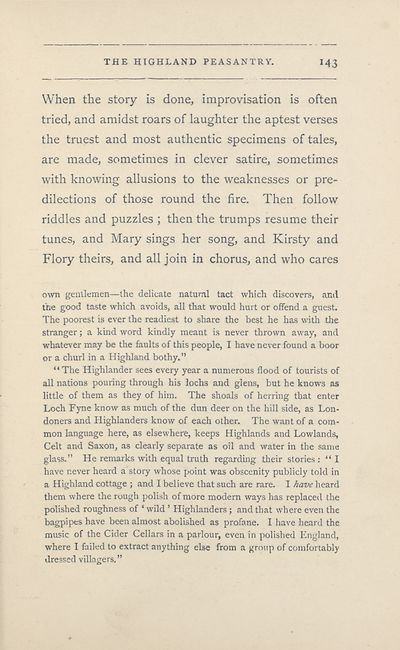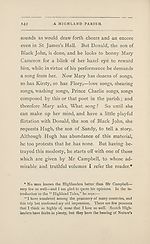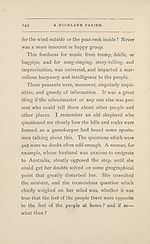Download files
Complete book:
Individual page:
Thumbnail gallery: Grid view | List view

THE HIGHLAND PEASANTRY.
M3
When the story is done, improvisation is often
tried, and amidst roars of laughter the aptest verses
the truest and most authentic specimens of tales,
are made, sometimes in clever satire, sometimes
with knowing allusions to the weaknesses or pre¬
dilections of those round the fire. Then follow
riddles and puzzles ; then the trumps resume their
tunes, and Mary sings her song, and Kirsty and
Flory theirs, and all join in chorus, and who cares
own gentlemen—the delicate natural tact which discovers, and
the good taste which avoids, all that would hurt or offend a guest.
The poorest is ever the readiest to share the best he has with the
stranger; a kind word kindly meant is never thrown away, and
whatever may be the faults of this people, I have never found a boor
or a churl in a Highland bothy.”
“ The Highlander sees every year a numerous flood of tourists of
all nations pouring through his lochs and glens, but he knows as
little of them as they of him. The shoals of herring that enter
Loch Fyne know as much of the dun deer on the hill side, as Lon¬
doners and Highlanders know of each other. The want of a com¬
mon language here, as elsewhere, keeps Highlands and Lowlands,
Celt and Saxon, as clearly separate as oil and water in the same
glass.” He remarks with equal truth regardmg their stories : “ I
have never heard a story whose point was obscenity publicly told in
a Highland cottage ; and I believe that such are rare. I have heard
them where the rough polish of more modern ways has replaced the
polished roughness of ‘ wild ’ Highlanders; and that where even the
bagpipes have been almost abolished as profane. I have heard the
music of the Cider Cellars in a parlour, even in polished England,
where I failed to extract anything else from a group of comfortably
dressed villagers.”
M3
When the story is done, improvisation is often
tried, and amidst roars of laughter the aptest verses
the truest and most authentic specimens of tales,
are made, sometimes in clever satire, sometimes
with knowing allusions to the weaknesses or pre¬
dilections of those round the fire. Then follow
riddles and puzzles ; then the trumps resume their
tunes, and Mary sings her song, and Kirsty and
Flory theirs, and all join in chorus, and who cares
own gentlemen—the delicate natural tact which discovers, and
the good taste which avoids, all that would hurt or offend a guest.
The poorest is ever the readiest to share the best he has with the
stranger; a kind word kindly meant is never thrown away, and
whatever may be the faults of this people, I have never found a boor
or a churl in a Highland bothy.”
“ The Highlander sees every year a numerous flood of tourists of
all nations pouring through his lochs and glens, but he knows as
little of them as they of him. The shoals of herring that enter
Loch Fyne know as much of the dun deer on the hill side, as Lon¬
doners and Highlanders know of each other. The want of a com¬
mon language here, as elsewhere, keeps Highlands and Lowlands,
Celt and Saxon, as clearly separate as oil and water in the same
glass.” He remarks with equal truth regardmg their stories : “ I
have never heard a story whose point was obscenity publicly told in
a Highland cottage ; and I believe that such are rare. I have heard
them where the rough polish of more modern ways has replaced the
polished roughness of ‘ wild ’ Highlanders; and that where even the
bagpipes have been almost abolished as profane. I have heard the
music of the Cider Cellars in a parlour, even in polished England,
where I failed to extract anything else from a group of comfortably
dressed villagers.”
Set display mode to:
![]() Universal Viewer |
Universal Viewer | ![]() Mirador |
Large image | Transcription
Mirador |
Large image | Transcription
| Antiquarian books of Scotland > Scotland/Scots > Reminiscences of a Highland parish > (155) |
|---|
| Permanent URL | https://digital.nls.uk/109513310 |
|---|
| Description | Thousands of printed books from the Antiquarian Books of Scotland collection which dates from 1641 to the 1980s. The collection consists of 14,800 books which were published in Scotland or have a Scottish connection, e.g. through the author, printer or owner. Subjects covered include sport, education, diseases, adventure, occupations, Jacobites, politics and religion. Among the 29 languages represented are English, Gaelic, Italian, French, Russian and Swedish. |
|---|

